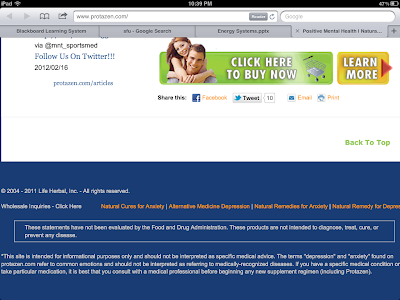http://www.protazen.com is a website I found to be a good example of an unreliable source. The website advertises a "natural cure for depression". The website has advertisements all over it, and there is no evidence of an experimental or epidemological evdience to support it - other then "success stories" from customers. The website probably benefits from advertising, therefore they have financial gain from marketing protazen. It simply is not logical for this product to be marketed because at the bottom of the webpage there is a small paragraph stating that the product is in no way able to cure disease. One would have to ask what is the purpose of the "all natural depression cure" if it cannot cure disease at all? The purpose of this blog post is to point out key things to look for when deciding if a website is credible or not. Here are some red flags to watch out for:
1. In the blue section, the screen shot shows that the site says:
"These statements have not been evaluated by the Food and Drug Administration. These products are not intended to diagnose, treat, cure or prevent any disease."
This is the first red flag one should see as it basically states the entire webpage is a waste of time. The product will not fix any sort of disease, therefore, not curing one's depression or anxiety.
2. The product is being advertised on a webpage that anyone could have purchased for personal use. The name for the website http://protazen.com is quite simple, anybody with extra money can run a ".com" website. There is no specific, credited doctor or pharmacist promoting the drug.
3. The advertisements on the website suggest that the operator of the website could be getting paid extra money to have brands and other services available to the consumer online, therefore, giving them motive to continue marketing this product.
depressionhurts.ca is a credible source with little to no advertising because the creators of the site have a genuine interest in the mental health of society. There is different interactive options on the website that involve the viewer. The website is not trying to sell anything, which gives them no kind of motive for marketing false information.
4. The majority of evidence that says the product is legitimate is only anecdotal: success stories of people explaining how the product worked for them and the wonderful ways the product changed their life. No evidence suggests it was tested and proved by any sort of scientific team.
The National Institute of Mental Health is a credible government website that show information on research updates and have research teams working toward improving lives of people with mental health issues. The website also discusses research areas and there is a blog for sharing ideas on the website as well.



No comments:
Post a Comment